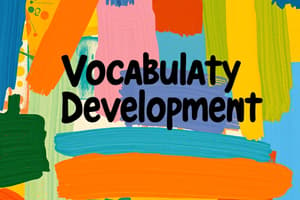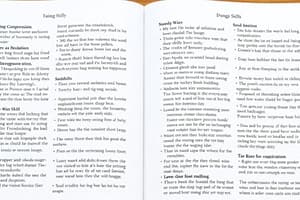Podcast
Questions and Answers
What is the primary benefit of having a wide vocabulary?
What is the primary benefit of having a wide vocabulary?
- It allows for the use of obscure words.
- It makes writing longer.
- It enhances comprehension in reading and listening tasks. (correct)
- It reduces the need for active reading strategies.
Which technique is NOT effective for building vocabulary?
Which technique is NOT effective for building vocabulary?
- Using flashcards.
- Avoiding unfamiliar words. (correct)
- Reading widely.
- Engaging actively with new vocabulary.
What aspect does NOT contribute to reading comprehension?
What aspect does NOT contribute to reading comprehension?
- Memorizing vocabulary lists. (correct)
- Summarizing and questioning the text.
- Using prior knowledge.
- Identifying main ideas.
Which of the following strategies is essential for evaluating the credibility of sources?
Which of the following strategies is essential for evaluating the credibility of sources?
Which of the following terms is NOT a part of speech?
Which of the following terms is NOT a part of speech?
What is an example of grammatical agreement?
What is an example of grammatical agreement?
What reading strategy is useful for inferring meaning from a text?
What reading strategy is useful for inferring meaning from a text?
Understanding different text structures aids in what aspect of reading comprehension?
Understanding different text structures aids in what aspect of reading comprehension?
Flashcards
Vocabulary
Vocabulary
The words and phrases a person understands and uses.
Reading Comprehension
Reading Comprehension
Understanding and interpreting written texts
Grammar Rules
Grammar Rules
Rules for sentence structure and word use.
Main Ideas
Main Ideas
Signup and view all the flashcards
Supporting Details
Supporting Details
Signup and view all the flashcards
Active Reading
Active Reading
Signup and view all the flashcards
Parts of Speech
Parts of Speech
Signup and view all the flashcards
Sentence Structure
Sentence Structure
Signup and view all the flashcards
Study Notes
Vocabulary
- Vocabulary refers to the collection of words and phrases understood and used by a person or group.
- Expanding vocabulary is crucial for effective communication, both written and oral.
- A wide vocabulary enhances comprehension in reading and listening tasks.
- Vocabulary development is an ongoing process, and it's important to learn new words consistently.
- Techniques for building vocabulary include reading widely, using flashcards, and actively engaging with new vocabulary.
- Contextual clues within sentences and paragraphs help in understanding the meanings of unfamiliar words.
- Synonyms, antonyms, and related words can help in expanding vocabulary.
- Word roots and prefixes/suffixes provide insights into word origins and meanings.
- Learning the etymology (origin and history) of words deepens understanding.
- Using online resources, dictionaries, and thesauruses can aid vocabulary acquisition.
Reading Comprehension
- Reading comprehension involves understanding and interpreting written text.
- Key aspects of reading comprehension include identifying main ideas, supporting details, and the author's purpose.
- Active reading strategies, such as questioning, summarizing, and note-taking, enhance comprehension.
- Effective reading strategies also include previewing the text and using prior knowledge.
- Evaluating the credibility and accuracy of sources is essential in reading comprehension during academic research.
- Inferring meaning from the text, drawing conclusions, and recognizing implications are vital parts of reading comprehension.
- Understanding different text structures (e.g., cause-and-effect, compare-and-contrast) is helpful in comprehending various texts.
- Connecting ideas in a text to personal experiences and prior knowledge strengthens understanding.
- Avoiding misunderstandings due to ambiguous language and figurative expressions is crucial, requiring the ability to analyze context.
- Identifying the author's perspective and bias helps in critically evaluating the text.
Grammar
- Grammar encompasses the rules and structures that govern the formation of sentences.
- Understanding grammatical concepts like parts of speech (nouns, verbs, adjectives, adverbs, etc.) is fundamental.
- Sentence structure, including simple, compound, and complex sentences, affects clarity and meaning.
- Grammatical agreement (subject-verb, pronoun-antecedent) is crucial for correctness.
- Correct use of tenses (past, present, future) and aspects (progressive, perfect) enhances precision and clarity.
- Understanding punctuation (commas, periods, semicolons, etc.) enhances readability and clarifies meaning.
- Identifying and correcting errors in grammar improves written communication.
- Different grammatical structures in different writing styles (formality, informality, argumentative, etc.).
- Adherence to standard grammatical conventions is vital in academic writing.
- Understanding and using appropriate grammatical structures across subjects and disciplines is crucial for academic excellence.
Studying That Suits You
Use AI to generate personalized quizzes and flashcards to suit your learning preferences.
Description
Test your knowledge on vocabulary and reading comprehension techniques. This quiz will cover strategies for expanding your word bank and enhance your understanding of texts. Perfect for anyone looking to improve their communication skills and comprehension abilities.




